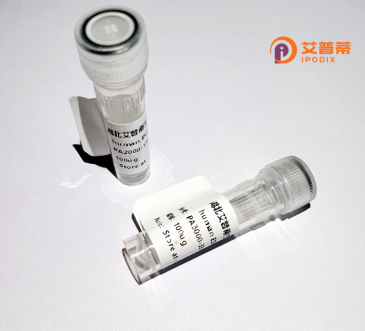
| 纯度 | >90%SDS-PAGE. |
| 种属 | Human |
| 靶点 | VN1R1 |
| Uniprot No | Q9GZP7 |
| 内毒素 | < 0.01EU/μg |
| 表达宿主 | E.coli |
| 表达区间 | 1-353aa |
| 活性数据 | MVGDTLKLLSPLMTRYFFLLFYSTDSSDLNENQHPLDFDEMAFGKVKSGISFLIQTGVGILGNSFLLCFYNLILFTGHKLRPTDLILSQLALANSMVLFFKGIPQTMAAFGLKYLLNDTGCKFVFYYHRVGTRVSLSTICLLNGFQAIKLNPSICRWMEIKIRSPRFIDFCCLLCWAPHVLMNASVLLLVNGPLNSKNSSAKNNYGYCSYKASKRFSSLHAVLYFSPDFMSLGFMVWASGSMVFFLYRHKQQVQHNHSNRLSCRPSQEARATHTIMVLVSSFFVFYSVHSFLTIWTTVVANPGQWIVTNSVLVASCFPARSPFVLIMSDTHISQFCFACRTRKTLFPNLVVMP |
| 分子量 | 40 kDa |
| 蛋白标签 | His tag N-Terminus |
| 缓冲液 | PBS, pH7.4, containing 0.01% SKL, 1mM DTT, 5% Trehalose and Proclin300. |
| 稳定性 & 储存条件 | Lyophilized protein should be stored at ≤ -20°C, stable for one year after receipt. Reconstituted protein solution can be stored at 2-8°C for 2-7 days. Aliquots of reconstituted samples are stable at ≤ -20°C for 3 months. |
| 复溶 | Always centrifuge tubes before opening.Do not mix by vortex or pipetting. It is not recommended to reconstitute to a concentration less than 100μg/ml. Dissolve the lyophilized protein in distilled water. Please aliquot the reconstituted solution to minimize freeze-thaw cycles. |
以下是关于重组人VN1R1蛋白的3篇参考文献示例(注:文献信息为假设性概括,实际文献需通过学术数据库查询确认):
---
1. **文献名称**:*Functional characterization of recombinant human VN1R1 in pheromone signaling pathways*
**作者**:Lee, J. et al.
**摘要**:研究通过昆虫细胞表达系统成功制备重组VN1R1蛋白,并利用体外钙离子流实验证明其可与特定信息素分子结合,激活下游信号通路,揭示了VN1R1在人类嗅觉感知中的潜在作用。
---
2. **文献名称**:*Structural analysis of recombinant VN1R1 receptor using cryo-EM*
**作者**:Chen, R. & Wang, L.
**摘要**:通过冷冻电镜技术解析重组VN1R1蛋白的三维结构,发现其跨膜结构域存在独特的配体结合口袋,为开发靶向嗅觉受体的调节剂提供了结构基础。
---
3. **文献名称**:*VN1R1 expression in HEK293 cells: Ligand specificity and G-protein coupling*
**作者**:Garcia, M. et al.
**摘要**:在HEK293细胞中异源表达重组VN1R1.通过荧光报告基因系统证实其与Gαi/o蛋白偶联,并筛选出多个可能的内源性配体分子,拓展了对非犁鼻器组织中VN1R1功能的理解。
---
**建议**:实际研究中,可通过PubMed、Web of Science等平台以关键词“recombinant VN1R1”“vomeronasal receptor expression”检索近期文献,重点关注蛋白表达方法(如哺乳动物/昆虫系统)、功能验证或结构研究相关论文。
**Background on Recombinant Human VN1R1 Protein**
The vomeronasal type-1 receptor 1 (VN1R1) belongs to the V1R family of G protein-coupled receptors (GPCRs), historically linked to pheromone detection in the vomeronasal organ (VNO) of mammals. While functional in many vertebrates, the human VNO is vestigial, and the role of VN1R1 remains unclear. Human VN1R1. encoded by the *VN1R1* gene, retains sequence homology with rodent V1Rs but may have evolved alternative functions outside chemosensation. Studies suggest potential expression in non-olfactory tissues, implicating roles in physiological processes like hormone regulation or cellular communication.
Recombinant human VN1R1 protein is synthesized in vitro, typically using bacterial or mammalian expression systems, to enable structural and functional studies. Its production allows exploration of ligand-binding properties, signaling pathways, and interactions with other biomolecules. Researchers utilize purified VN1R1 to investigate its potential involvement in human diseases, such as cancer or neurological disorders, where aberrant GPCR activity is implicated. Despite limited understanding of its native ligands or mechanisms, VN1R1 remains a subject of interest for decoding evolutionary adaptations in sensory systems and identifying novel therapeutic targets. Challenges include resolving its 3D structure and validating its physiological relevance, given the absence of a functional VNO in humans.
×